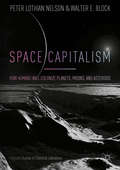- Table View
- List View
Sozialunternehmen
by Sebastian GöseDas Buch unterstützt Unternehmen bei der Integration von Menschen mit Behinderung in den 1. Arbeitsmarkt. So versucht die Case Study ein Grundverständnis dafür zu schaffen, welche Herausforderungen das Management von Sozialunternehmen beinhaltet. Dazu werden insbesondere Themen aus der Personalführung, dem Personalmanagement, der Unternehmenskultur sowie die besonderen Bedürfnisse von Menschen mit Handicap analysiert. Darüber hinaus wird erarbeitet, was ein „Social Business“ von „Social Entrepreneurship“ oder „Social Enterprise“ unterscheidet. Außerdem wird das Social Business mit Blick auf die direkte und indirekte Erfüllung gesellschaftlicher Bedürfnisse mit dem „Commercial Business“ verglichen. So wird herausgearbeitet, wie speziell Sozialunternehmen als neue Unternehmensform Menschen mit Handicap helfen und von diesen genutzt werden können. Die Case Study beschreibt, wie ein Businessplan von einem Unternehmen in der Sozialwirtschaft aussehen könnte. Darüber hinaus wird die spezielle Unternehmenskultur am Beispiel der AfB gGmbH diskutiert und wie sich diese von der herkömmlicher Unternehmen unterscheidet. Des Weiteren werden die besonderen Herausforderungen bei der Akquise von Menschen mit Handicap und deren Integration in ein Unternehmen behandelt.So setzen sich die Bearbeiterinnen und Bearbeiter mit den Entwicklungsmöglichkeiten der AfB gGmbH auseinander und entwickeln ein nachhaltiges Konzept zur gewünschten Expansion des Unternehmens.Die Leuphana Case Studies sind ein Projekt, das in Zusammenarbeit mit kleinen und mittelständischen Unternehmen erstellt und entwickelt worden ist. Sie sind ein Lehrbuch, mit dessen Hilfe Unternehmen, die vor ähnlichen Herausforderungen stehen, selbige bewältigen können. Dafür ist keine Hilfe von Dritten notwendig. Auf Grundlage der einzelnen Case Studies werden den Bearbeiterinnen und Bearbeitern elementare Werkzeuge aus der wissenschaftlichen Theorie erklärt. Diese können sie anwenden, um mit den Insiderkenntnissen des eigenen Unternehmens Prozesse zu optimieren, Ziele entwickeln und erreichen oder schwierige Herausforderungen zu bewältigen.
Sozialunternehmertum, Innovationen und Wirkungsmessung: Praktische Umsetzung gesellschaftlicher Veränderungen zu einer Impact-zentrierten Wirtschaft
by Lilli LeirichDieses Buch beschreibt ein neues Paradigma für eine wirkungszentrierte Wirtschaft und zeigt anhand von Sozialunternehmen, dass eine gleichzeitige Ausrichtung an Gemeinwohl, Profit und Innovation möglich ist. Ökologie, Soziales und Ökonomie dürfen nicht länger als separate, gegensätzliche Bereiche behandelt werden. Es ist möglich, positive gesellschaftliche Veränderungen zu bewirken und gleichzeitig wirtschaftlich erfolgreich zu sein. Dabei spielt die Neubewertung des Erfolgsbegriffs eine ausschlaggebende Rolle. Nach einer Einführung in soziale Innovationen und Unternehmen, Impact-Denken und Wirkungsmessung wird im Buch ausführlich dargestellt, wie die Monetarisierung bzw. Inwertsetzung sozialer Bereiche möglich ist und wie die gesellschaftliche Wirkung in die externe Rechnungslegung eines Unternehmens übertragen werden kann. Im Anschluss werden drei Social Start-ups, deren Vision, Kernaktivitäten, Wirkungsempfänger, Finanzierung und Herausforderungen vorgestellt und anhand einer Chain of Impact eine Bewertung, Messung und Integration der Organisationswirkung vorgenommen. Der Inhalt Soziale Innovationen und Sozialunternehmen Impact-Denken und Wirkungsmessung – Relaunch der Finanzbuchhaltung Sozialunternehmen rechnen und schreiben Geschichte
Sozialwirtschaft kompakt: Grundzüge der Sozialwirtschaftslehre (essentials)
by Wolf Rainer WendtDieses essential enthält eine kurze und prägnante Darstellung der Theorie sozialen Wirtschaftens. Es erhellt den Handlungsbereich der personenbezogenen Wohlfahrtsproduktion im sozialen Versorgungssystem und im organisierten Zusammenwirken professioneller, frei engagierter und selbstbetroffener Akteure. In der Sozialwirtschaftslehre wird die Erbringung sozialer und gesundheitsbezogener Leistungen institutionell und funktional begriffen.
Sozialökonomie: Eine kritische Einführung (Basiswissen Sozialwirtschaft und Sozialmanagement)
by Susanne VaudtDas Lehrbuch liefert Studierenden der Sozialen Arbeit, der Sozialwirtschaft und des Sozialmanagements anschaulich und kompakt relevantes Wissen über Ökonomisierungsprozesse in der Sozialen Arbeit. Ursachen und Folgen neoliberaler Vermarktlichungstendenzen sozialer Einrichtungen und Dienste werden verständlich und konzentriert dargelegt. Als Kontrastfolie bietet es außerdem einen grundlegenden Einblick in kapitalismuskritische Theorieansätze und solidarisch-alternative Wirtschaftsformen.
Soñar es poder.La historia y las claves del éxito del español que consiguió acompañar al presidente Obama hasta la Casa
by Juan VerdeLa autobiografía personal y profesional del hombre que codirigió la campaña internacional de reelección de Obama en su camino a la Casa Blanca, un libro necesario e inspiracional con el mensaje claro de que no hay imposibles y de que tú sí puedes conseguir tus sueños. ¿Cómo un joven español de familia humilde puede convertirse en un empresario y asesor de éxito y llegar a trabajar con Bill y Hillary Clinton, Al Gore, Ted Kennedy, entre otros, y llegar a convertirse una pieza clave dentro del Gobierno de Barack Obama? ¿Cuáles son las claves de su éxito? En Soñar es poder el asesor del presidente Obama Juan Verde escribe en primera persona las peripecias que lo llevaron a Estados Unidos y cómo allí descubrió cuál era su sueño y cómo luchó para conseguirlo. Una historia plagada de entusiasmo y de lucha, de convicción y de valentía, un guion que comienza en una pequeña localidad de Gran Canaria y que termina en Washingtonen la Casa Blanca. Juan Verde te habla en esta obra de la importancia de creer en un sueño, de sentir pasión por lo que haces, de lo importante que es asumir riesgos y de ponerte siempre al servicio del otro. Estos tres últimos son para él no sólo los tres pilares sobre los que se construye una carrera de éxito, sino que constituyen su propia filosofía de vida.
Space 2.0: Revolutionary Advances in the Space Industry (Springer Praxis Books)
by Joseph N. PeltonA true revolution has rocked the space industry, as Silicon Valley and new startup companies around the world have shaken up the status quo. This has in turn triggered a hefty response among traditional aerospace companies, launching the sector into the new Space 2.0. This book explains how and why this remarkable change has happened, starting from the industry’s origins during the Space Age and working its way to the present day. No other industry in the world has experienced the dramatic shift in technology and services as rapidly as the field of satellite services and rocket launch systems has. This book analyzes the dynamic shift over the past decade in how satellites are designed, manufactured, launched, and operated. It also turns an eye to the future, discussing the amazing feats and potential issues we can expect from this shifting arena by 2030. With its beginner-friendly writing style and plethora of illustrations, this book serves as a perfect introductory text to students and professionals alike wishing to learn more about the key trends in the field of space applications and launch systems.
Space Angels, Multiple Equilibria, and Financing the Space Economy
by Matthew C. Weinzierl Alissa HaddajiCase
Space Capitalism: How Humans will Colonize Planets, Moons, and Asteroids (Palgrave Studies in Classical Liberalism)
by Peter Lothian Nelson Walter E. BlockThis book compares and contrasts the motivations, morality, and effectiveness of space exploration when pursued by private entrepreneurs as opposed to government. The authors advocate market-driven, private initiatives take the lead through enhanced competition and significant resources that can be allocated to the exploration and exploitation of outer space. Space travel and colonisation is analysed through the prism of economic freedom and laissez faire capitalism, in a unique and accessible book.
Space Data Corp.
by Alan MaccormackSpace Data Corp. plans to partner with the U.S. National Weather Service to place transceivers on weather balloons and thereby create a national mobile communications network. The company is in the late development stages and is planning to launch a regional test that will demonstrate its ability to provide paging and messaging. It intends to sell its service to existing mobile carriers, such as Skytel and Verizon, rather than directly to end users. This case illustrates how Space Data has applied flexible business processes throughout its initial market research and technology development to create a system that can make optimal use of its limited resources and respond rapidly to changing conditions. As the case concludes, the executive team at Space Data faces three opportunities, each with very different costs and benefits for the company. It can proceed with a regional test of paging and messaging as planned, leap forward to develop a more complex but potentially more lucrative voice service (forgoing a regional test), or make a transition to the small but financially stable telemetry market. Includes color exhibits.
Space Financing
by Matthew C. Weinzierl Nicole Tempest Keller Brendan RosseauThis note provides an update on the space financing state of play in 2021.
Space Fostering African Societies: Developing the African Continent Through Space, Part 4 (Southern Space Studies)
by Annette FroehlichThis peer-reviewed book provides detailed insights into how space and its applications are, and can be used to support the development of the full range and diversity of African societies, as encapsulated in the African Union’s Agenda 2063. Following on from Part 1 to Part 3, which was highly acclaimed by the space community, it focuses on the role of space in supporting the UN Sustainable Development Goals in Africa, but covers an even more extensive array of relevant and timely topics addressing all facets of African development. It demonstrates that, while there have been significant achievements in recent years in terms of economic and social development, which have lifted many of Africa’s people out of poverty, there is still a great deal that needs to be done to fulfill the basic needs of Africa's citizens and afford them the dignity they deserve. To this end, space is already being employed in diverse fields of human endeavor to serve Africa’s goals for its future, but there is much room for further incorporation of space systems and data. Providing a comprehensive overview of the role space is playing in helping Africa achieve its developmental aspirations, the book will appeal to both students and professionals in fields such as space studies, international relations, governance, social, rural and technical development.
Space Fostering African Societies: Developing the African Continent Through Space, Part 5 (Southern Space Studies)
by Annette FroehlichThis peer-reviewed book provides detailed insights into how space and its applications are, and can be used to support the development of the full range and diversity of African societies, as encapsulated in the African Union’s Agenda 2063. Following on from Part 1 to Part 4, which were highly acclaimed by the space community, it focuses on the role of space in supporting the UN Sustainable Development Goals in Africa, but covers an even more extensive array of relevant and timely topics addressing all facets of African development. It demonstrates that, while there have been significant achievements in recent years in terms of economic and social development, which have lifted many of Africa’s people out of poverty, there is still a great deal that needs to be done to fulfill the basic needs of Africa's citizens and afford them the dignity they deserve. To this end, space is already being employed in diverse fields of human endeavor to serve Africa’s goals for its future, but there is much room for further incorporation of space systems and data. Providing a comprehensive overview of the role space is playing in helping Africa achieve its developmental aspirations, the book will appeal to both students and professionals in fields such as space studies, international relations, governance, social, rural and technical development.
Space Fostering African Societies: Developing the African Continent through Space, Part 1 (Southern Space Studies)
by Annette FroehlichThis book provides detailed insights into how space and its applications are, and can be, used to support the development of the full range and diversity of African societies, as encapsulated in the African Union’s Agenda 2063. Like previous books in the "Southern Space Studies" series, it focuses on the role of space in supporting the UN Sustainable Development Goals in Africa, but it covers an even more extensive array of relevant and timely topics addressing all facets of African development. It demonstrates that, while great achievements have been made in recent years in terms of economic and social development, which has lifted many of Africa’s people out of poverty, there is still much that needs to be done to fulfill the basic needs of Africa's citizens and afford them the dignity they deserve: to this end space is already being employed in diverse fields of human endeavor to serve Africa’s goals for its future, but there is much room for further incorporation of space systems and data. Providing a comprehensive overview of the role space is playing in achieving Africa’s developmental aspirations, the book is of great interest to both students and professionals in fields such as space studies, international relations, governance, social and rural development, and many others.
Space Fostering African Societies: Developing the African Continent through Space, Part 2 (Southern Space Studies)
by Annette FroehlichThis peer-reviewed book provides detailed insights into how space and its applications are, and can be used to support the development of the full range and diversity of African societies, as encapsulated in the African Union’s Agenda 2063. Following on from Part 1, which was highly acclaimed by the space community, it focuses on the role of space in supporting the UN Sustainable Development Goals in Africa, but covers an even more extensive array of relevant and timely topics addressing all facets of African development. It demonstrates that, while there have been significant achievements in recent years in terms of economic and social development, which have lifted many of Africa’s people out of poverty, there is still a great deal that needs to be done to fulfill the basic needs of Africa's citizens and afford them the dignity they deserve. To this end, space is already being employed in diverse fields of human endeavor to serve Africa’s goals for its future, but there is much room for further incorporation of space systems and data. Providing a comprehensive overview of the role space is playing in helping Africa achieve its developmental aspirations, the book will appeal to both students and professionals in fields such as space studies, international relations, governance, and social and rural development.
Space Fostering Brazilian Society: Developing Brazil Through Space (Southern Space Studies)
by Annette Froehlich Ian GrosnerThis peer-reviewed book provides a comprehensive overview of the role of space exploration and technology in Brazil. The Brazilian space sector is currently experiencing rapid growth, with new participants entering the field and space applications increasingly supporting the country's social, economic, and political development. There is a growing recognition of space as a vital component of Brazil's development agenda. Despite significant progress in recent years that has improved the living conditions of many Brazilians and helped lift people out of poverty, much work remains to be done to meet the basic needs of all citizens and ensure they receive the respect they deserve. Space technology is already being utilized in various sectors to help achieve Brazil's future objectives, and there are still ample opportunities to expand the use of space systems and data. The book will be of interest to researchers, professionals, and students in fields such as space studies, international relations, governance, and social and rural development.
Space Fostering Latin American Societies: Developing the Latin American Continent Through Space, Part 2 (Southern Space Studies)
by Annette FroehlichThis peer-reviewed book presents a comprehensive overview of the role space is playing in enabling Latin America to fulfill its developmental aspirations. Following on from the highly acclaimed Part 1, it explains how space and its applications can be used to support the development of the full range and diversity of Latin America societies, while being driven by Latin American goals. The Latin American space sector is currently undergoing a phase of rapid and dynamic expansion, with new actors entering the field and with space applications increasingly being used to support the continent’s social, economic, and political development. All across Latin America, attention is shifting to space as a fundamental part of the continental development agenda, and the creation of a Latin American space agency is evidence of this. Additionally, while in recent years, significant advances in economic and social development have lifted many of Latin America’s people out of poverty, there is still much that needs to be done to fulfill the basic needs of the population and to afford them the dignity they deserve. To this end, space is already being employed in diverse fields of human endeavor to serve Latin America’s goals for its future, but there is still a need for further incorporation of space systems and data. This book will appeal to researchers, professionals and students in fields such as space studies, international relations, governance, and social and rural development.
Space Fostering Latin American Societies: Developing the Latin American Continent Through Space, Part 3 (Southern Space Studies)
by Annette FroehlichThis peer-reviewed book presents a comprehensive overview of the role space is playing in enabling Latin America to fulfill its developmental aspirations. Following on from the highly acclaimed Part 1 and Part 2, it explains how space and its applications can be used to support the development of the full range and diversity of Latin America societies, while being driven by Latin American goals. The Latin American space sector is currently undergoing a phase of rapid and dynamic expansion, with new actors entering the field and with space applications increasingly being used to support the continent’s social, economic, and political development. All across Latin America, attention is shifting to space as a fundamental part of the continental development agenda, and the creation of a Latin American space agency is evidence of this. Additionally, while in recent years, significant advances in economic and social development have lifted many of Latin America’s people out of poverty, there is still much that needs to be done to fulfill the basic needs of the population and to afford them the dignity they deserve. To this end, space is already being employed in diverse fields of human endeavor to serve Latin America’s goals for its future, but there is still a need for further incorporation of space systems and data. This book will appeal to researchers, professionals and students in fields such as space studies, international relations, governance, and social and rural development.
Space Fostering Latin American Societies: Developing the Latin American Continent Through Space, Part 4 (Southern Space Studies)
by Annette FroehlichThis peer-reviewed book presents a comprehensive overview of the role space is playing in enabling Latin America to fulfil its developmental aspirations. Following on from the highly acclaimed Parts 1 to 3, it explains how space and its applications can be used to support the development of the full range and diversity of Latin America societies, while being driven by Latin American goals. The Latin American space sector is currently undergoing a phase of rapid and dynamic expansion, with new actors entering the field and with space applications increasingly being used to support the continent’s social, economic, and political development. All across Latin America, attention is shifting to space as a fundamental part of the continental development agenda, and the creation of a Latin American space agency is evidence of this. Additionally, while in recent years, significant advances in economic and social development have lifted many of Latin America’s people out of poverty, there is still much that needs to be done to fulfil the basic needs of the population and to afford them the dignity they deserve. To this end, space is already being employed in diverse fields of human endeavour to serve Latin America’s goals for its future, but there is still a need for further incorporation of space systems and data. This book will appeal to researchers, professionals and students in fields such as space studies, international relations, governance, and social and rural development.
Space Fostering Latin American Societies: Developing the Latin American Continent Through Space, Part 5 (Southern Space Studies)
by Annette FroehlichThis peer-reviewed book presents a comprehensive overview of the role space is playing in enabling Latin America to fulfil its developmental aspirations. Following on from the highly acclaimed Parts 1 to 4, it explains how space and its applications can be used to support the development of the full range and diversity of Latin America societies, while being driven by Latin American goals. The Latin American space sector is currently undergoing a phase of rapid and dynamic expansion, with new actors entering the field and with space applications increasingly being used to support the continent’s social, economic, and political development. All across Latin America, attention is shifting to space as a fundamental part of the continental development agenda, and the creation of a Latin American space agency is evidence of this. Additionally, while in recent years, significant advances in economic and social development have lifted many of Latin America’s people out of poverty, there is still much that needs to be done to fulfil the basic needs of the population and to afford them the dignity they deserve. To this end, space is already being employed in diverse fields of human endeavour to serve Latin America’s goals for its future, but there is still a need for further incorporation of space systems and data. This book will appeal to researchers, professionals and students in fields such as space studies, international relations, governance, and social and rural development.
Space Fostering Latin American Societies: Developing the Latin American Continent through Space, Part 1 (Southern Space Studies)
by Annette FroehlichThis book presents a comprehensive overview of the role space is playing in unlocking Latin America’s developmental aspirations. It explains how space and its applications can be used to support the development of the full range and diversity of Latin American societies, while being driven by Latin American goals. The Latin American space sector is currently undergoing a phase of rapid and dynamic expansion, with new actors entering the field and with space applications increasingly used to support the continent’s social, economic, and political development. All across Latin America, attention is shifting to space as a fundamental part of the continental development agenda, and the creation of a Latin American space agency is evidence of this. Additionally, while in recent years, great advances in economic and social development have lifted many of Latin America’s people out of poverty, there is still much that needs to be done to fulfill the basic needs of the population and to afford them the dignity they deserve. To this end, space is already being employed in diverse fields of human endeavor to serve Latin America’s goals for its future, but there is still a need for further incorporation of space systems and data. The book is of great interest to researchers, professionals and students in fields such as Space Studies, International Relations, Governance, Social and Rural Development, and many others.
Space Fostering Mexican Society: Developing Mexico Through Space (Southern Space Studies)
by Annette Froehlich Jorge Alfredo Ferrer PérezThis book provides a comprehensive overview of the role of space exploration and technology in Mexico. The Mexican space sector is currently experiencing rapid growth, with new participants entering the field and space applications increasingly supporting the country's social, economic, and political development. There is a growing recognition of space as a vital component of Mexico's development agenda. Despite significant progress in recent years that has improved the living conditions of many Mexicans and helped lift people out of poverty, much work remains to be done to meet the basic needs of all citizens and ensure they receive the respect they deserve. Space technology is already being utilized in various sectors to help achieve Mexico's future objectives, and there are still ample opportunities to expand the use of space systems and data. This book will interest researchers, professionals, and students in fields such as space studies, international relations, governance, and social and rural development.
Space Invaders: How Games Became So Important Without the Rest of Us Noticing
by John C. Beck Mitchell WadeThere is a big generation gap between baby boomers and a younger generation defined largely by having grown up on video games--the gamers. According to the authors, this gap is where a number of business behaviors originate. But where did the gap begin, and how did it get so big, so quickly? This chapter provides a short history of the rise of gaming and looks at why it's important for companies and managers to understand how gaming culture has shaped a generation of workers. This chapter is excerpted from "The Kids Are Alright: How the Gamer Generation Is Changing the Workplace."
Space Program Management
by Marcello Spagnulo Federico Nasini Mauro Balduccini Rick FleeterBeginning with the basic elements that differentiate space programs from other management challenges, Space Program Management explains through theory and example of real programs from around the world, the philosophical and technical tools needed to successfully manage large, technically complex space programs both in the government and commercial environment. Chapters address both systems and configuration management, the management of risk, estimation, measurement and control of both funding and the program schedule, and the structure of the aerospace industry worldwide.
Space Supporting Africa: Volume 1: A Primary Needs Approach and Africa’s Emerging Space Middle Powers (Studies in Space Policy #20)
by Annette Froehlich André SiebritsIn this book the background and context of Africa’s political and socio-economic landscape is presented and unpacked through a primary needs approach which focuses on climate, biodiversity, health, water, education, and space-related capacity building. African theoretical contributions from the International Relations field are discussed, and Africa’s new Space Policy and Strategy, along with debates around the establishment of an African Space Agency, are explored. The African International Space Ecosystem is then analyzed, including its dimensions of intra-African space relations and initiatives, African participation in COPUOS, and international space activities, agreements, and initiatives in Africa. The final part is dedicated to the national space infrastructure and activities of African states.
Space Supporting Africa: Volume 2: Education and Healthcare as Priority Areas in Achieving the United Nations Sustainable Development Goals 2030 (Studies in Space Policy #27)
by Annette Froehlich André Siebrits Christoffel KotzeThis book addresses the need to support decision-makers across Africa by promoting awareness of the importance of space technologies and data to African development through the presentation of existing examples where space supports education and healthcare, and by making recommendations for further roll-out of these efforts. This is necessary because of the enduring misconception that space-related research and expenditure competes with other, more pressing, needs on the continent, when in truth space can play a major role in meeting these needs.Accordingly, the book unpacks the United Nations Sustainable Development Goals (SDGs) 2030 and the critical needs they address in the African context. Secondly, it provides an analysis of the African higher education landscape and considers the network of higher education-related SDGs, their targets, and their indicators. Africa’s own development plan, Agenda 2063, is also explored. The African higher education landscape is then assessed by way of three models – the Space-Education Equation (SEE), the Benefits to Education by Space Transection (BEST), and the Enhanced Education for Sustainable Development Access and Success (EESDAS) model. The critical role of educational technologies and e-learning in bridging the educational access and success gap is appraised, as is the role of the space sector, and its technologies, applications, and data in African higher education. Finally, it explores e-health and provides an analysis of pertinent technologies required by e-health, past and present, and the opportunities and challenges it presents. Space technology can play a critical role in eliminating the barriers that are currently preventing e-health from playing a more significant role in a developing region such as sub-Saharan Africa.





















